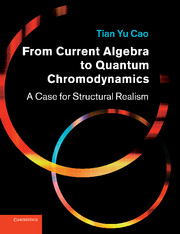Book contents
- Frontmatter
- Contents
- Preface
- 1 Introduction
- 2 The rise of current algebra
- 3 Sum rules
- 4 Saturation and closure
- 5 Scaling
- 6 Theorizations of scaling
- 7 The advent of QCD
- 8 Early justifications and explorations
- 9 Structural realism and the construction of QCD
- 10 Structural realism and the construction of the CA–QCD narrative
- References
- Author index
- Subject index
7 - The advent of QCD
Published online by Cambridge University Press: 06 December 2010
- Frontmatter
- Contents
- Preface
- 1 Introduction
- 2 The rise of current algebra
- 3 Sum rules
- 4 Saturation and closure
- 5 Scaling
- 6 Theorizations of scaling
- 7 The advent of QCD
- 8 Early justifications and explorations
- 9 Structural realism and the construction of QCD
- 10 Structural realism and the construction of the CA–QCD narrative
- References
- Author index
- Subject index
Summary
The underlying idea of current algebra, light-cone current algebra included, was to exploit the broken symmetry of strong interactions. The idea was pursued through abstracting physical predictions, as the consequences of the symmetry and in the form of certain algebraic relations obeyed by weak and electromagnetic currents of hadrons to all orders in strong interactions, from some underlying mathematical field theoretical models of hadrons and their interactions, more specifically from models of quark fields universally coupled to a neutral gluon field.
When current algebra was initially proposed, the symmetry was defined with respect to static properties of hadrons, such as mass, spin, charge, isospin, and strangeness. However, over the years, especially after the confirmation of scaling, in the changed theoretical and experimental context, the notion of symmetry underlying the current algebra project had undergone a transmutation. A new component of symmetry, that is, a dynamic symmetry, was brought into the scheme. The result was not only some adaptations in algebraic relations and corresponding physical predictions, but also a radical change in the nature of the underlying field theoretical model. More precisely, the result was the emergence of a gauge invariant quark–gluon model for strong interactions, or the genesis of quantum chromodynamics (QCD).
- Type
- Chapter
- Information
- From Current Algebra to Quantum ChromodynamicsA Case for Structural Realism, pp. 133 - 159Publisher: Cambridge University PressPrint publication year: 2010



